| No. | Portrait | Minister
(Constituency) | Term of office | Political party | Ministry | Chief Minister |
|---|
| From | To | Period |
|---|
| Minister of Textiles |
|---|
| 01 | | | Marotrao Kannamwar
(MLA for Saoli Constituency No. 73-
Chandrapur District)
(Legislative Assembly) | 01 May
1960 | 07 March
1962 | 1 year, 310 days | Indian National Congress | Yashwantrao I | 
Yashwantrao Chavan |
|---|
| 02 | | | Marotrao Kannamwar
(MLA for Saoli Constituency No. 73-
Chandrapur District)
(Legislative Assembly) | 08 March
1962 | 19 November
1962 | 256 days | Indian National Congress | Yashwantrao II |
|---|
| 03 | | | Gopalrao Bajirao Khedkar
(MLA for Akot Constituency No. 28-
Akola District)
(Legislative Assembly) | 20 November
1962 | 24 November
1963 | 1 year, 4 days | Indian National Congress | Kannamwar l | Marotrao Kannamwar |
|---|
| 04 | | | Parashuram Krishnaji Sawant
(MLA for Chiplun Constituency No. 265-
Ratnagiri District)
(Legislative Assembly)
(Interim Chief Minister) | 25 November
1962 | 04 December
1963 | 9 days | Indian National Congress | Sawant | Parashuram Krishnaji Sawant |
|---|
| 05 | | | D. S. Palaspagar
(MLC for Elected by MLAs Constituency No. 19 -
Bhandara District)
(Legislative Council) | 05 December
1963 | 01 March
1967 | 3 years, 86 days | Indian National Congress | Vasantrao I | 
Vasantrao Naik |
|---|
| 06 | |  | Shankarrao Chavan
(MLA for Bhokar Constituency No. 85-
Nanded District)
(Legislative Assembly) | 01 March
1967 | 27 October
1969 | 2 years, 240 days | Indian National Congress | Vasantrao II |
|---|
| 07 | | | Madhukar Dhanaji Chaudhari
(MLA for Raver Constituency No. 11-
Jalgaon District)
(Legislative Assembly) | 27 October
1969 | 13 March
1972 | 2 years, 138 days | Indian National Congress |
|---|
| 08 | |  | Vasantrao Patil
(MLC for Elected by MLAs Constituency No. 20 -
Sangli District)
(Legislative Council) | 13 March
1972 | 04 April
1973 | 1 year, 32 days | Indian National Congress | Vasantrao III |
|---|
| 09 | |  | Vasantrao Naik
(MLA for Pusad Constituency No. 81-
Yavatmal District)
(Legislative Assembly)
(Chief Minister) | 04 April
1973 | 17 Match
1974 | 347 days | Indian National Congress |
|---|
| 10 | | 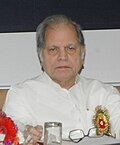 | Abdul Rahman Antulay
(MLA for Shrivardhan Constituency No. 193-
Raigad District)
(Legislative Assembly) | 17 Match
1974 | 21 February
1975 | 341 days | Indian National Congress |
|---|
| 11 | | | Rafiq Zakaria
(MLC for Elected by MLAs Constituency No. 16 -
Mumbai Suburban District)
(Legislative Council) | 21 February
1975 | 16 April
1977 | 2 years, 54 days | Indian National Congress | Shankarrao I | 
Shankarrao Chavan |
|---|
| 12 | | | Madhukar Dhanaji Chaudhari
(MLA for Raver Constituency No. 11-
Jalgaon District)
(Legislative Assembly) | 17 April
1977 | 07 March
1978 | 1 year, 324 days | Indian National Congress | Vasantdada I | 
Vasantdada Patil |
|---|
| 13 | | 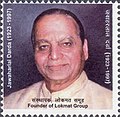 | Jawaharlal Darda
(MLC for Elected by MLAs Constituency No. 19 -
Yavatmal District)
(Legislative Council) | 07 March
1978 | 18 July
1978 | 133 days | Indian National Congress | Vasantdada II |
|---|
| 14 | | | Hashmukhbhai Upadhaya
(MLA for Kandivali Constituency No. 161-
Mumbai Suburban District)
(Legislative Assembly) | 18 July
1978 | 18 February
1980 | 1 year, 215 days | Janata Party | Pawar I | 
Sharad Pawar |
|---|
| 15 | | | Nanabhau Yembadwar
(MLC for Bhandara - Gondia Local Authorities Constituency No. 14 -
Gondia District)
(Legislative Council) | 09 June
1980 | 21 January
1982 | 1 year, 226 days | Indian National Congress | Antulay | 
Abdul Rahman Antulay |
|---|
| 16 | | | Shantaram Gholap
(MLA for Murbad Constituency No. 139-
Thane District)
(Legislative Assembly) | 21 January
1982 | 02 February
1983 | 1 year, 12 days | Indian National Congress | Bhosale | 
Babasaheb Bhosale |
|---|
| 17 | | | Ramrao Adik
(MLC for Elected by MLAs Constituency No. 05 -
Ahmednagar District)
(Legislative Council)
(Deputy Chief Minister) | 07 February
1983 | 05 March
1985 | 2 years, 26 days | Indian National Congress | Vasantdada III | 
Vasantdada Patil |
|---|
| 18 | | | V. Subramanian
(MLA for South Mumbai Constituency No. 121-
Mumbai City District)
(Legislative Assembly) | 12 March
1985 | 03 June
1985 | 83 days | Indian National Congress | Vasantdada IV |
|---|
| 19 | | | Sudhakarrao Naik
(MLA for Pusad Constituency No. 81-
Yavatmal District)
(Legislative Assembly) | 03 June
1985 | 12 March
1986 | 282 days | Indian National Congress | Nilangekar | Shivajirao Patil Nilangekar |
|---|
| 20 | |  | Vilasrao Deshmukh
(MLA for Latur City Constituency No. 235-
Latur District)
(Legislative Assembly) | 12 March
1986 | 26 June
1988 | 2 years, 106 days | Indian National Congress | Shankarrao II | 
Shankarrao Chavan |
|---|
| 21 | | | W. R. Sherekar
(MLC for Elected by MLAs Constituency No. 22 -
Chandrapur District)
(Legislative Council) | 26 June
1988 | 03 March
1990 | 1 year, 250 days | Indian National Congress | Pawar II | 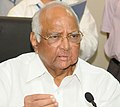
Sharad Pawar |
|---|
| 22 | | | Narendra Marutrao Kamble
(MLC for Elected by Governor Nominated No. 10 -
Mumbai City District)
(Legislative Council) | 03 March
1990 | 25 January
1991 | 328 days | Indian National Congress | Pawar III |
|---|
| 23 | |  | Jawaharlal Darda
(MLC for Elected by MLAs Constituency No. 19 -
Yavatmal District)
(Legislative Council) | 25 January
1991 | 25 June
1991 | 151 days | Indian National Congress |
|---|
| 24 | |  | Jawaharlal Darda
(MLC for Elected by MLAs Constituency No. 19 -
Yavatmal District)
(Legislative Council) | 25 June
1991 | 22 February
1993 | 1 year, 242 days | Indian National Congress | Sudhakarrao | Sudhakarrao Naik |
|---|
| 25 | | | Sarawan Parate
(MLC for Elected by MLAs Constituency No. 14 -
Kolhapur District)
(Legislative Council) | 06 March
1993 | 18 November
1994 | 1 year, 257 days | Indian National Congress | Pawar IV | 
Sharad Pawar |
|---|
| 26 | | | Jaiprakash Mundada
(MLA for Basmath Constituency No. 92-
Hingoli District
(Legislative Assembly) | 14 March
1995 | 01 February
1999 | 3 years, 324 days | Shiv Sena | Joshi | 
Manohar Joshi |
|---|
| 27 | |  | Nitin Gadkari
(MLC for Nagpur Graduates Constituency No. 03 -
Nagpur District)
(Legislative Council) | 01 February
1999 | 11 May
1999 | 99 days | Bharatiya Janata Party | Rane | 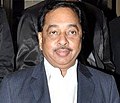
Narayan Rane |
|---|
| 28 | | | Jaiprakash Mundada
(MLA for Basmath Constituency No. 92-
Hingoli District
(Legislative Assembly) | 11 May
1999 | 17 October
1999 | 159 days | Shiv Sena |
|---|
| 29 | |  | Vilasrao Deshmukh
(MLA for Latur City Constituency No. 235-
Latur District)
(Legislative Assembly)
(Chief Minister) | 19 October
1999 | 27 October
1999 | 8 days | Indian National Congress | Deshmukh I | 
Vilasrao Deshmukh |
|---|
| 30 | |  | Ranjeet Deshmukh
(MLA for Savner Constituency No. 49-
Nagpur District)
(Legislative Assembly) | 27 October
1999 | 16 January
2003 | 3 years, 81 days | Indian National Congress |
|---|
| 31 | |  | Ranjeet Deshmukh
(MLA for Savner Constituency No. 49-
Nagpur District)
(Legislative Assembly) | 18 January
2003 | 01 November
2004 | 1 year, 295 days | Indian National Congress | Sushilkumar | 
Sushilkumar Shinde |
|---|
| 32 | |  | Vilasrao Deshmukh
(MLA for Latur City Constituency No. 235-
Latur District)
(Legislative Assembly)
(Chief Minister) | 01 November
2004 | 09 November
2004 | 8 days | Indian National Congress | Deshmukh II | 
Vilasrao Deshmukh |
|---|
| 33 | |  | Ashok Chavan
(MLA for Bhokar Constituency No. 85-
Nanded District)
(Legislative Assembly) | 09 November
2004 | 01 December
2008 | 4 years, 22 days | Indian National Congress |
|---|
| 34 | | | Anees Ahmed
(MLA for Nagpur Central Constituency No. 55-
Nagpur District
(Legislative Assembly) | 08 December
2008 | 06 November
2009 | 333 days | Indian National Congress | Ashok I | 
Ashok Chavan |
|---|
| 35 | | | Mohammed Arif Naseem Khan
(MLA for Chandivali Constituency No. 168-
Mumbai Suburban District)
(Legislative Assembly) | 07 November
2009 | 10 November
2010 | 1 year, 3 days | Indian National Congress | Ashok II |
|---|
| 36 | | | Mohammed Arif Naseem Khan
(MLA for Chandivali Constituency No. 168-
Mumbai Suburban District)
(Legislative Assembly) | 11 November
2010 | 26 September
2014 | 3 years, 319 days | Indian National Congress | Prithviraj | 
Prithviraj Chavan |
|---|
| 37 | |  | Chandrakant Patil
(MLA for Kothrud Constituency No. 210-
Pune District)
(Legislative Assembly) | 31 October
2014 | 08 July
2016 | 1 year, 251 days | Bharatiya Janata Party | Fadnavis I | 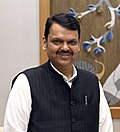
Devendra Fadnavis |
|---|
| 38 | |  | Subhash Deshmukh
(MLA for Solapur South Constituency No. 251-
Solapur District
(Legislative Assembly) | 08 July
2016 | 16 June
2019 | 2 years, 343 days | Bharatiya Janata Party |
|---|
| 39 | | | Ram Shinde
(MLA for Karjat Jamkhed Constituency No. 127-
Ahmednagar District)
(Legislative Assembly) | 16 June
2019 | 12 November
2019 | 149 days | Bharatiya Janata Party |
|---|
| 40 | |  | Devendra Fadnavis
(MLA for Nagpur South West Constituency No. 52-
Nagpur District)
(Legislative Assembly)
(Chief_Minister)
In Charge | 23 November
2019 | 28 November
2019 | 5 days | Bharatiya Janata Party | Fadnavis II |
|---|
| 41 | |  | Nitin Raut
(MLA for Nagpur North Constituency No. 57-
Nagpur District)
(Legislative Assembly) | 28 November
2019 | 30 December
2019 | 32 days | Indian National Congress | Thackeray | 
Uddhav Thackeray |
|---|
| 42 | | | Aslam Shaikh
(MLA for Malad West Constituency No. 162-
Mumbai Suburban District)
(Legislative Assembly) | 30 December
2019 | 29 June
2022 | 2 years, 181 days | Indian National Congress |
|---|
| 43 | |  | Eknath Shinde
(MLA for Kopri-Pachpakhadi Constituency No. 147-
Thane District)
(Legislative Assembly)
(Chief Minister)
In Charge | 30 June
2022 | 14 August
2022 | 45 days | Shiv Sena (Shinde Group) | Eknath | 
Eknath Shinde |
|---|
| 44 | |  | Chandrakant Patil
(MLA for Kothrud Constituency No. 210-
Pune District)
(Legislative Assembly) | 14 August
2022 | 26 November
2024 | 2 years, 135 days | Bharatiya Janata Party |
|---|
| 45 | |  | Devendra Fadnavis
(MLA for Nagpur South West Constituency No. 52-
Nagpur District)
(Legislative Assembly)
(Chief_Minister)
In Charge | 05 December
2024 | 21 December
2024 | 16 days | Bharatiya Janata Party | Fadnavis III | 
Devendra Fadnavis |
|---|
| 46 | | | Sanjay Savkare
(MLA for Bhusawal Constituency No. 12-
Jalgaon District
(Legislative Assembly) | 21 December
2024 | Incumbent | 294 days | Bharatiya Janata Party |
|---|
|





























